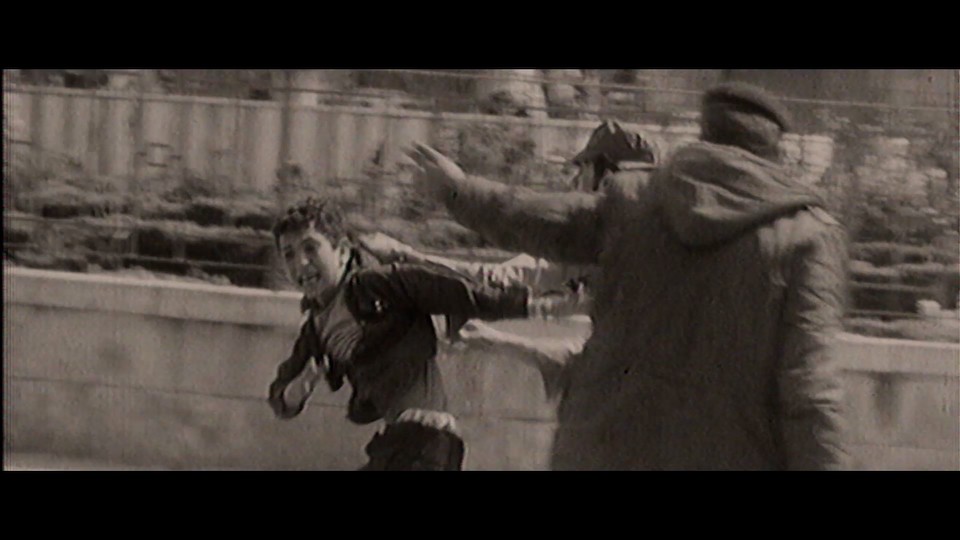59th New York Film Festival Documentary Review by Carole Di Tosti . . .
Israeli filmmaker Avi Mograbi (Avenge But One of My Two Eyes, 43rd NYFF) has plunged whole heartedly into his exploration and shocking expose of Israel’s Occupation of the Palestinian territories of the West Bank and the Gaza Strip in the aftermath of the 1967 Six-Day War. Using scores of eyewitnesses, first-hand testimonies by the Israeli Military, he presents them as whistleblowers. Such an expose has otherwise been kept hidden from the mainstream news organizations and outlets.
What makes this film so astonishing is that it is edited in a straightforward, realistic style without any tricks or showmanship. Mograbi doesn’t want anything to get in the way of his decade by decade chronicle of how the military, much to their own chagrin, annoyance and stress have abused the Palestinian people in the Gaza Strip and the West Bank. The abuse and violence have been encouraged by the negligence of the Israeli government to maintain an equanimity and balance with regard to the Palestinians who owned property in these areas. The soldiers admit they threatened, beat and bullied Palestinians to evacuate their homes so that eventually, Jewish settlements could be established unopposed in the various areas in the West Bank.
These lands were never purchased; the Palestinians were never remunerated. In effect what occurs is an illegal theft justified as the spoils of war. The occupying government successively turned a blind eye to the theft, and even encouraged it with their oppressive laws and behaviors if Palestinians attempted to take a stand for their rights and fight back.
Mograbi presents himself as the ironic narrator explaining a “how to” of occupation. With illustrations, video clips from the past that reveal the violence, and additional proof, Mograbi shows his “manual,” in other words the way to take over a society with the paramount goal of land usurpation that begins with a military occupation.
Step by step he outlines what one must do to systematically deprive individuals of their rights, their property, their self-governance. It is done so gradually that dehumanization is normalized in the perspective of the military and the occupiers who have come to believe it is their right and due to be settlers on lands which are not theirs. Ultimately, when the occupiers are challenged, they make themselves the victims, obviating responsibility and accountability for their unjust actions which in any sane individual would provoke a response.
With a “no-holds barred” approach, Mograbi includes videotaped interviews of the military soldiers who effected this gradual dehumanization. He intercuts their discussions with the scenes of devastation: the homes in rubble, the walled incarceration of a culture and people, the desecration of what was once fruitful farms and lands. He also includes soldiers’ testimonies of torture and arrests, which have no basis but to keep the Palestinian families afraid and cowed.
Thus, the government, not by happenstance, but by intention, Mograbi suggests, purposed the extreme duress, suffering and misery in the daily lives of those who live in the areas of occupation. What was not intentioned was the equal dehumanization of the occupiers who are rendered soulless in their abuse and control of others.
Through each decade of the 54 years of Israel’s augmenting usurpation of land, the soldiers, some in their 50s and 60s and others currently in their twenties provide unequivocal proof of how the Israeli government commanded them to systemically oppress and wipe out a viable culture and society by dispossessing Palestinians as “the other.” Their job of maintaining control using threats, violence and fear has obviously taken a toll on the soldiers. The fact that they are willing to be shown on film with their names and dates printed with their faces indicates that they are verifying this information in the hope that the terrible actions on both sides will stop.
Mograbi holds nothing back in his “matter-of-fact” revelations of Israel’s distorted policies. For example, Palestinians are walled up to prevent their movement in the name of creating safety for Jewish settlers. But Israel, itself, has created the terrible situation. The tragedy is that in these areas, everyone suffers including the Jewish settlers who fear reprisal for usurping lands that are not theirs.
The abused, tormented and oppressed, children, women and old people who attempt to stand up for themselves cannot do so, but for the violence enacted against them. This in turn has created a counteraction of violence against Israel by Palestinians and their allies from surrounding countries. And it has provided the flow of terrorism and finger-pointing on both sides, as self-governance becomes an impossibility. The escalation of violence is circular and without end.
Mograbi’s film is devastating in tone. His narration and all the combined videos and interviews and film clips reveal the horror of what is happening. Though he removes judgment by being “instructive,” didactic” and without emotion, he achieves the opposite effect. One cannot help but question how such a perpetrated violence and genocide is allowed to continue with no positive force holding Israel to account. Mograbi enumerates the attempted peace accords and shows how and why they failed. And ultimately, he reveals that Israel’s own policies have turned it into a monster of bellicosity and conflict, provoking a monstrous response in Palestinian/Arab revenge. Finally, Mograbi’s film is a sardonic call for peace. It is an incredible historical indictment of the evils of military occupation in Israel.
For tickets and times go to the 59th NYFF website. https://www.filmlinc.org/nyff2021/guide/


















